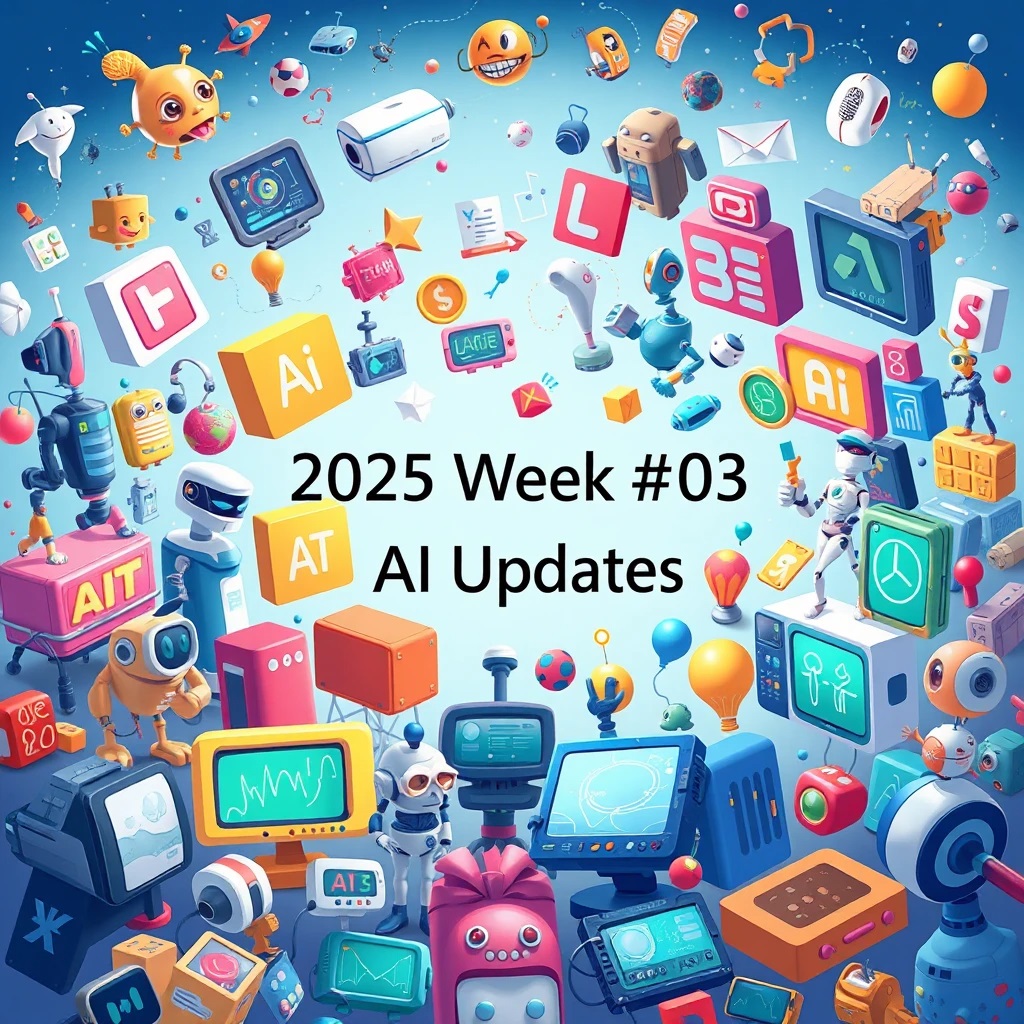Last Updated on January 22, 2025 by Editor
After Week 2‘s developments, as we delve into the latest developments in artificial intelligence from January 15 to January 21, 2025, this week has been marked by significant advancements across various sectors. From groundbreaking features in AI platforms to substantial funding for innovative startups, the landscape is evolving rapidly. Major tech players like Google, IBM, and Microsoft are enhancing their offerings, while new startups are attracting attention and investment. Join us as we explore the most impactful news stories shaping the future of AI technology.
Key Takeaways
- Massive AI Investments: Tech leaders pledged $500 billion to enhance AI infrastructure in the U.S., creating jobs and strengthening innovation.
- Blueprint for Ethical AI: The WEF introduced a global framework to promote fairness, transparency, and accountability in AI.
- Generative AI in Action: Companies like L’Oréal are leveraging AI for sustainable product design, showcasing AI’s role in eco-conscious innovation.
- Breakthrough Models: DeepSeek’s R1 model challenges global benchmarks, marking significant advancements in reasoning AI.
- Exciting Launches: Perplexity’s Sonar API and Meta’s real-time translation tools highlight AI’s evolving real-world applications.
Blueprint for Equitable AI by World Economic Forum
The World Economic Forum (WEF) has introduced a comprehensive blueprint aimed at promoting equitable artificial intelligence (AI) practices globally. This initiative, announced during the WEF’s annual meeting in Davos, Switzerland, seeks to address the ethical concerns surrounding AI technologies and their societal impacts. The blueprint emphasizes the need for collaboration among governments, businesses, and civil society to ensure that AI benefits all segments of society, particularly marginalized communities.
Key components of the plan include establishing clear guidelines for AI development and deployment, promoting transparency in AI algorithms, and ensuring accountability for AI systems’ outcomes. The WEF highlights the importance of diverse data sets to mitigate biases in AI models, which can lead to discriminatory practices. Additionally, the initiative calls for investment in education and training programs to equip individuals with the skills necessary to thrive in an AI-driven economy.
The WEF’s blueprint aligns with growing global concerns about AI’s potential to exacerbate inequality and its implications for privacy and security. As AI technologies continue to evolve rapidly, this framework aims to foster responsible innovation that prioritizes human rights and social good. By advocating for a multi-stakeholder approach, the WEF hopes to create a sustainable ecosystem where AI can flourish while serving the interests of all.
DeepSeek’s R1 Reasoning Model Rivals OpenAI in Performance
Chinese AI lab DeepSeek has made headlines with the release of its reasoning model, DeepSeek-R1, which it claims rivals OpenAI’s O1 on various benchmarks. Launched on January 20, 2025, R1 is available on Hugging Face under an MIT license, allowing commercial use without restrictions. DeepSeek asserts that R1 outperforms O1 on key benchmarks such as AIME, MATH-500, and SWE-bench Verified, showcasing its capabilities in reasoning tasks.
DeepSeek-R1 boasts an impressive 671 billion parameters, which enhances its problem-solving abilities across domains like physics and mathematics. The model is designed to fact-check itself during reasoning processes, making it more reliable than traditional models that often struggle with accuracy. In addition to the full version, DeepSeek has released distilled versions ranging from 1.5 billion to 70 billion parameters, enabling deployment on various hardware setups.
While DeepSeek’s advancements are notable, the model faces scrutiny due to China’s regulatory environment, which imposes restrictions on sensitive topics. Despite these challenges, R1’s performance suggests that Chinese AI labs are rapidly advancing their capabilities in response to international competition.
L’Oréal Leverages Generative AI for Sustainable Cosmetics
L’Oréal is stepping into the future of cosmetics with a commitment to sustainability through generative AI technologies. Announced on January 19, 2025, this initiative aims to reduce environmental impact by optimizing product formulations and packaging designs using AI-driven insights. By harnessing generative design techniques, L’Oréal plans to create innovative cosmetic products that align with eco-friendly practices.
The use of generative AI allows L’Oréal to analyze vast amounts of data related to consumer preferences and environmental factors. This approach not only enhances product development but also minimizes waste by predicting optimal ingredient combinations and packaging solutions. As part of its sustainability strategy, L’Oréal is also focusing on reducing carbon emissions throughout its supply chain.
This move reflects a broader trend in the beauty industry towards integrating technology for sustainable practices. By prioritizing eco-conscious innovation, L’Oréal aims to appeal to environmentally aware consumers while setting a precedent for other companies in the sector.
Tech Leaders Pledge Up to $500 Billion for U.S. AI Investment
In a significant show of commitment towards advancing artificial intelligence infrastructure in the United States, tech leaders have pledged up to $500 billion in investments over the next few years. This announcement was made during a press conference at the White House on January 21, 2025. The initiative aims to bolster America’s position as a global leader in AI technology while creating job opportunities across various sectors.
The investment will focus on developing data centers and enhancing computing capabilities essential for powering advanced AI applications. Key players involved include major corporations such as OpenAI and SoftBank, alongside tech giants like Microsoft and Oracle. The collaborative effort is expected to generate approximately 100,000 jobs nationwide.
This pledge comes at a time when there is increasing recognition of the critical role that robust infrastructure plays in supporting innovation within the tech industry. As demand for AI solutions continues to grow exponentially, these investments are seen as crucial for maintaining competitiveness against other nations.
Perplexity Launches Sonar: An API for Enhanced AI Search
Perplexity has launched Sonar, an innovative API service designed for enterprises and developers looking to integrate generative AI search capabilities into their applications. Announced on January 21, 2025, Sonar enables real-time connections to trusted sources online while providing customized search results tailored to specific needs.
The API comes in two tiers: a base version that offers cost-effective solutions and Sonar Pro designed for more complex inquiries requiring detailed answers. Notably, companies like Zoom are already utilizing Sonar within their platforms for enhanced user experiences during video conferencing sessions.
This launch represents Perplexity’s strategic move towards expanding its market presence amidst increasing competition in the API landscape while providing affordable access options for developers seeking robust search functionalities.
Anthropic Plans Two-Way Voice Mode for Claude
Anthropic is set to enhance its chatbot Claude by introducing a two-way voice mode along with memory features that allow Claude to retain information from past interactions with users. This announcement was made by CEO Dario Amodei during discussions at the World Economic Forum on January 21, 2025.The anticipated voice mode aims to facilitate more natural conversations between users and Claude while improving user engagement through personalized interactions based on memory retention.
Amodei noted that Anthropic has experienced overwhelming demand over recent months but has faced challenges related to computing capabilities necessary for scaling operations effectively.
As competition heats up among leading AI firms like OpenAI and Anthropic strives towards innovation within conversational agents remains critical amidst rapid advancements within this sector.
Metropolis Acquires Oosto: A Strategic Move in Computer Vision
AI vision startup Metropolis has announced its acquisition of Oosto (formerly known as AnyVision) for $125 million as part of its strategy to enhance its computer vision capabilities within parking solutions. This acquisition comes amid ongoing challenges faced by certain startups seeking exits due to market pressures.
Metropolis aims to leverage Oosto’s advanced computer vision technology alongside its existing platform offerings while expanding into new markets where visual recognition plays a vital role in operational efficiency. This move reflects broader trends within the tech industry where consolidation among startups is becoming increasingly common amid economic uncertainties.
By integrating Oosto’s expertise into its operations, Metropolis hopes not only strengthen its competitive edge but also provide innovative solutions tailored towards enhancing user experiences across various applications involving computer vision technologies.
Chinese AI Company Minimax Releases Competitive Models
Chinese tech company Minimax has unveiled new models that it claims are competitive with some of the industry’s best offerings during an event held on January 15, 2025. These developments come at a time when Chinese firms are increasingly focused on advancing their capabilities amid international scrutiny surrounding technology exports.
Minimax’s models aim at addressing various applications including natural language processing (NLP) tasks while showcasing significant improvements over previous iterations regarding performance metrics such as accuracy and efficiency levels compared against established players like OpenAI or Google’s offerings.
As competition intensifies globally within artificial intelligence sectors particularly between Chinese companies seeking recognition alongside established Western counterparts—Minimax’s advancements signal ongoing efforts towards innovation driven by local talent pools committed towards pushing boundaries within this field.
Czech Republic’s Struggles in AI Startup Funding
Despite having a growing number of AI startups, the Czech Republic has ranked last in Central and Eastern Europe for total funding raised by these ventures, securing only €24 million in 2024. This figure represents a dramatic decline from €87 million in 2023, highlighting challenges in attracting investment despite a robust startup ecosystem focused on machine learning and robotics.
Recent reports indicate that over 64% of funding rounds in Central and Eastern Europe are occurring at the seed stage, suggesting a trend toward early-stage innovation in AI technologies. This shift may reflect investor confidence in nascent ideas and solutions within the sector
KPMG Survey Highlights Business Leaders’ Ambitions for GenAI
According to KPMG’s latest AI Quarterly Pulse Survey, a significant 67% of business leaders anticipate that AI will fundamentally transform their operations within the next two years. The survey indicates a strong commitment to generative AI (GenAI) initiatives, with over half of the respondents exploring the use of AI agents. However, only 12% have deployed them, signaling a gap between ambition and execution. Challenges such as data quality and employee adoption persist, with only 25% of employees currently using AI in their workflows. Notably, productivity has emerged as the top ROI metric for 79% of respondents, highlighting the urgent need for effective measurement strategies as organizations navigate their AI journeys.
Meta Introduces SeamlessM4T: Real-Time Speech Translation in 101 Languages
Meta has unveiled its SeamlessM4T technology, a groundbreaking AI system capable of real-time speech translation in 101 languages. This innovation aims to enhance global communication by allowing users to converse seamlessly across language barriers. The technology utilizes advanced machine learning algorithms to ensure high accuracy and speed in translations, potentially revolutionizing how businesses and individuals interact internationally. As global collaboration increases, tools like SeamlessM4T could become essential for effective communication in diverse environments.
ChatGPT Adds Tasks Agentic Feature for Enhanced Productivity
OpenAI has introduced a new feature called “Tasks” for its ChatGPT platform, allowing users to manage reminders and action items directly within their chats. This feature is designed to enhance productivity by enabling users to schedule tasks seamlessly while engaging in conversations. The rollout targets premium subscribers first, reflecting OpenAI’s strategy to provide added value to its paid user base. This move is seen as part of a broader trend where AI tools are increasingly integrated into daily workflows, aiming to simplify task management and improve efficiency.
This week’s AI updates reflect a dynamic and rapidly evolving landscape, with major tech companies and innovative startups pushing the boundaries of what is possible. The advancements in AI tools, funding influxes, and new partnerships signal a robust commitment to harnessing artificial intelligence across industries. As we continue to witness these exciting developments, we invite you to stay tuned for next week’s update, where we’ll bring you the latest insights and trends shaping the future of AI technology. Thank you for joining us!




